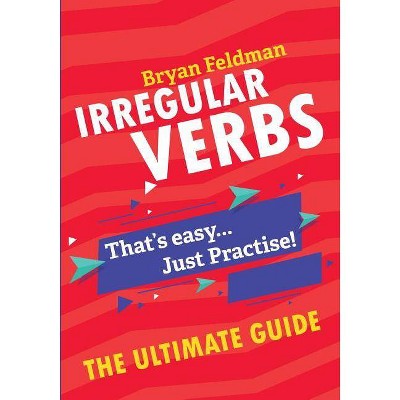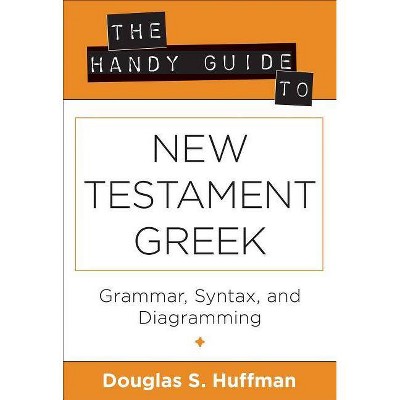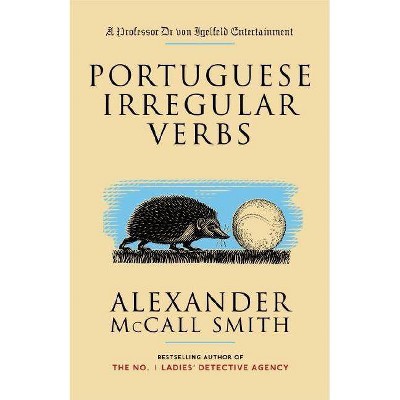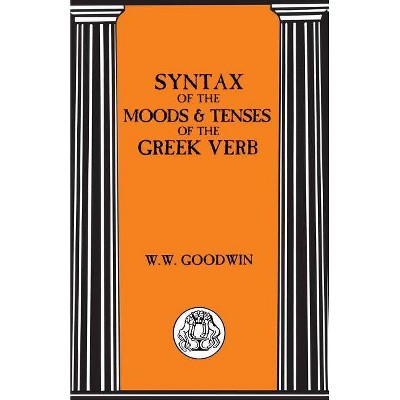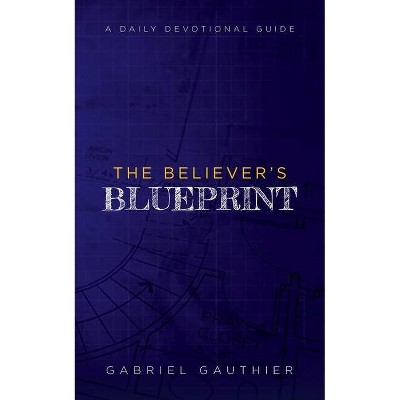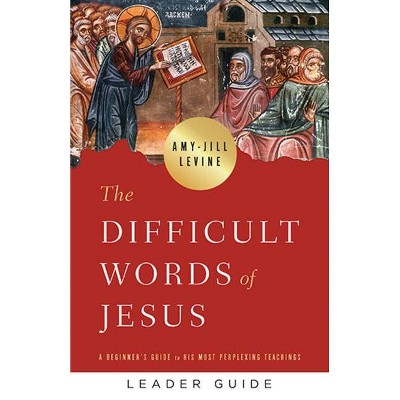The Handy Guide to Difficult and Irregular Greek Verbs - by Jon C Laansma & Randall X Gauthier (Paperback)
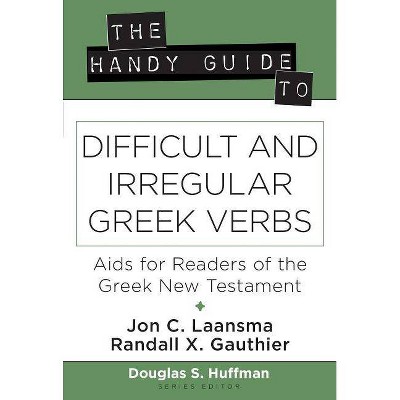
Similar Products
Products of same category from the store
AllProduct info
<p/><br></br><p><b> Book Synopsis </b></p></br></br><b>This book is a go-to reference for the instructor and a lifeline for the Greek student.<br>--Max Lee, North Park Theological Seminary</b> <p/><i>The Handy Guide to Difficult and Irregular Greek Verbs</i> is a learning aid especially for those transitioning from beginning courses in Greek to regular reading of the New Testament. This resource helps students learn those irregular Greek forms that are otherwise difficult to place; it's also perfect for pastors, biblical scholars, and anyone who learned Greek years ago and wants to improve their ease of reading the New Testament.<p/><br></br><p><b> Review Quotes </b></p></br></br><br>"<i>The Handy Guide to Difficult and Irregular Greek Verbs</i> by Laansma and Gauthier is the next logical step in time saving tools for students who have come to see that mastery is within their grasp. As is the case with all such guides, including <i>Kubo's Reader's Greek-English Lexicon of the NT</i> and <i>Metzger's Lexical Aids for Students of NT Greek</i> on whose shoulders it stands, this little volume is a resource one hopes to outgrow. Those two earlier works are by functional necessity linked to the first principle part (almost exclusively) even though that form is rarely the most commonly encountered element of the word. The rationale in the opening pages of the Handy Guide (which all teachers and second year students could benefit from reading) clearly lays out the nature of this disconnect. Students need a simple, efficient means for connecting attested forms with the nearly theoretical lexical ones they have labored to learn. <p/>Teachers have long recognized the conundrum this creates even for a diligent learner (to say nothing of the more haphazard student). Too often, the learners are left to their own devices after being saddled with the responsibility for connecting the various dissimilar forms of a single verb. While in isolated cases, thoughtful pedagogy may tailor instruction and perhaps exercises to address the gap created by the structure of our tools, this <i>parvum opus</i> meets the need by hitting the target at which it aims, making it unnecessary to reinvent the wheel. I expect this work will become a welcome element of the Greek learner's tool kit. I anticipate requiring my students to use this booklet to complete assignments aimed at demonstrating to both the teacher and student a growing familiarity with its contents through retention. The student's expanding facility with recognition, a quicker and easier comprehension, and consequent gains in reading speed will all serve as tangible encouragement and evidence of progress in their quest for facility with Greek verbal forms. Through the use of this guide, ultimately, reading will become more enjoyable."--Douglas Penney, Associate Professor of Classical Languages, Wheaton College (6/16/2017 12:00:00 AM)<br><br>"After my Greek studies at Bob Jones University, I was asked by a fellow seminary student how I could read the Greek New Testament so easily. I responded that it was because my Greek professor required us to memorize the principal parts of irregular verbs. For over twenty years, I have required the same of my Greek students at The Masters University. Now Laansma and Gauthier have made it easier than ever before to decide which are the most useful principal parts to know. You will never be able to read the Greek New Testament fluently without knowing these irregular and difficult verbs. The best endorsement that I can give for this invaluable book is that I will immediately adopt it for my classes."--William Varner, Professor of Bible and Greek, The Master's University (6/16/2017 12:00:00 AM)<br><br>"For Greek students wanting to prioritize their learning of irregular verbs, this book will be a valuable tool. I know of no other resource that arrays so much lexical and morphological data in such a helpful way for improving one's Greek."--N. Clayton Croy, Tutor in New Testament, Wycliffe Hall, University of Oxford (6/16/2017 12:00:00 AM)<br><br>"Irregular verbs regularly afflict students of New Testament Greek. They are a source of intense frustration and the dread that initiates bouts of procrastination. Tools abound that help to some degree, but even the standard lexicon by Bauer, Danker, Arndt, and Gingrich only lists the <i>inflected</i> forms of these irregular verbs that occur in early Christian literature. What has long been needed is a frequency list that shows the irregular principal parts and patterns of these verb stems. Brilliant ideas are often marked by the instant recognition that they meet a felt need. Laansma and Gauthier have provided this in a format that is elegant in its very simplicity."--Daniel B. Wallace, Senior Research Professor, Dallas Theological Seminary (6/16/2017 12:00:00 AM)<br><br>"Jon Laansma and Randall Gauthier seem to have read the embarrassed minds of all of us who studied Koine Greek formally a long time ago, but still find ourselves needing to treat it with sensitivity and precision--as of course we must do in order to render any reliable account of ancient sacred literature in Greek. The Handy Guide's organization by frequency of verb forms and by groups of compound verbs is ingenious, cutting through the necessarily daunting layouts of lexicons and grammars and providing many shortcuts to the great question in every case: What is this verb, in its context, actually doing? <i>The Handy Guide to Difficult and Irregular Greek Verbs</i> will live on top of my pile of reference books as I make the first pass in my new translation of the Gospels."--Sarah Ruden, Translator, Poet, Scholar (6/16/2017 12:00:00 AM)<br><br>"Laansma and Gauthier are correct that irregular verbs are the bane of Greek students. Their approach facilitates the student's understanding and acquisition of such verbs. <i>The Handy Guide to Difficult and Irregular Greek Verbs</i> could be used as a basis for assignments over which students would be quizzed or as a reference resource for students to use when they encounter difficult forms. I would seriously consider using this book as a required text in several courses. We spend the last three weeks of the semester reading from the New Testament, and our students would be helped by using this resource when they encounter irregular verbs."--David Turner, Professor of New Testament, Grand Rapids Theological Seminary (6/16/2017 12:00:00 AM)<br><br>"Laansma and Gauthier's work does three important things: (1) draws attention to a critical but overlooked and underappreciated area: learning and knowing the irregular verb stems that occur commonly in the New Testament, (2) prioritizes the most relevant stems to be learned, and (3) suggests that the Greek New Testament "must be read." So thanks to Laansma and Gauthier, students of Greek don't just have a list of randomly-selected principal parts to learn. They have a smart list--a list that has been carefully selected based on frequency of occurrence. But more important, they are encouraged and empowered to read, and to read the Greek New Testament! So perhaps Laansma and Gauthier will help banish a "paint by numbers" approach to Greek New Testament, put to flight the notion that the Greek text is <i>merely</i> one of many tools at the minister's disposal, and in general ignite a renaissance in the study of God's word in the original language. There is only one thing left to say: buy it and reduce it to tatters through constant use."--Jay E. Smith, Professor of New Testament Studies, Dallas Theological Seminary (6/16/2017 12:00:00 AM)<br><br>"Most students of Greek tend to become overwhelmed at some point by the sheer variety of forms that must be learned. This handy new resource provides just the guidance that is needed to help new readers navigate the more challenging verb forms in the Greek New Testament, so that through a consistent habit of reading, they will begin to internalize and truly learn the language."--Martin M. Culy, Founding Editor, Baylor Handbook on the Greek New Testament (6/16/2017 12:00:00 AM)<br><br>"Students frequently struggle to recognize irregular Greek verbs. With this handy guide from Laansma and Gauthier, professors can now provide their students with a pedagogically-sound and innovative method for mastering the heretofore recalcitrant forms. I am pleased to know of and recommend this resource."--Robert L. Plummer, Professor of New Testament Interpretation, Southern Baptist Theological Seminary (6/16/2017 12:00:00 AM)<br><br>"This book gives students of Greek access to irregular verb forms in a way that will greatly assist them in actually navigating and learning this material. The only wonder is that no one thought of writing this book before."--Douglas J. Moo, Chair, Biblical Studies; Chair, Committee on Bible Translation, Wheaton College (6/16/2017 12:00:00 AM)<br><br>"This well-designed and carefully compiled resource is an invaluable aid for all who want to develop the habit of regular reading in the Greek New Testament. Every teacher and aspiring student of New Testament Greek knows how difficult it is to develop a ready recognition of certain commonly occurring irregular verb forms (e.g., second aorist stems, etc.). On the other hand, teachers and their persevering students know how liberating it is for reading New Testament texts when these are finally mastered! To be able to read the New Testament and other Hellenistic Greek texts comfortably, and without constant recourse to grammatical helps, should be the goal of all who want to interpret the New Testament capably. This book is unequalled in the help that it provides toward reaching that goal. I recommend it enthusiastically."--Buist Fanning, Department Chair and Senior Professor of NT Studies, Dallas Theological Seminary (6/16/2017 12:00:00 AM)<br><br>"What a little gem of a book! Just what the doctor ordered for ailing Greek students struggling with irregular verb forms! Not only have Laansma and Gauthier created a tool for students to focus upon and learn the most frequently-occurring inflected forms of an irregular verb, but they have given instructors a way to teach and assess their Greek classes more effectively. I plan on using the handy guide for writing my quizzes so I don't test students on a form of the irregular verb which seldom appears in the New Testament. One of the guide's best uses for teachers is its easy access to the most regularly used forms for typically hard to learn verbs like φέρω, ἔρχομαι, γίνομαι, ὁράω, ἵστημι, and the like. It is helpful to see in a glance all the principal parts of a given verb and note right away the most used difficult and irregular forms in bolded lettering. Accessible, concise, simple in format, and fairly comprehensive in scope, this book is a go-to reference for the instructor and a life-line for the Greek student. Bravo!"--Max Lee, Associate Professor of New Testament, North Park Theological Seminary (6/16/2017 12:00:00 AM)<br><br>Laansma and Gauthier have developed a new approach to an old problem--how to parse difficult verb forms. A helpful feature of this book is their treating all compounded forms of a verb in the same list. This will no doubt be a welcome aid to students of New Testament Greek as they learn to identify these forms for themselves.--Stanley E. Porter "McMaster Divinity College" (8/1/2017 12:00:00 AM)<br><br>Many students of New Testament Greek need help in the leap from basic introductory courses to efficient and enjoyable reading of the text. One part of that hurdle is the mastery of irregular verbs. Here is a set of fine tools to help you overcome the challenge. The key part of this volume is a listing of all irregular verbs, in both their simplex and their compound forms, in decreasing frequency of usage. That means the student can set realistic goals in the pursuit of the mastery of forms, gradually tackling the rarer forms. And if that student is really wise, he or she will use this tool in conjunction with regular reading of the Greek New Testament.--D. A. Carson, Research Professor New Testament "Trinity Evangelical Divinity School" (8/1/2017 12:00:00 AM)<br>
Price History
Cheapest price in the interval: 12.29 on November 8, 2021
Most expensive price in the interval: 12.29 on December 20, 2021
Price Archive shows prices from various stores, lets you see history and find the cheapest. There is no actual sale on the website. For all support, inquiry and suggestion messagescommunication@pricearchive.us
